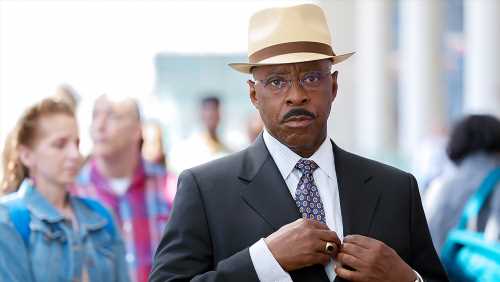
Bank robbers tend to be fairly easy to root for in movies. After all, it’s not the audience’s money getting pocketed onscreen. They typically don’t want to kill anybody, and their schemes tend to be pretty spectacular. “Heist 88,” a new Showtime release inspired by a real-life Chicago robbery from the year 1988, doesn’t trust viewers to be so accepting, so it spends most of its time underlining the generic reasons that its aggrieved crack team have for taking on the job. It’s a crime film that finds little joy in criminality, crammed with characters who’ve been backed into a corner, hindered by an overarching morality that doesn’t match the material.
Courtney B. Vance leads the feature as Jeremy Horne, an over-the-hill thief about to head back to prison. At a celebration of life for his brother, remembered as a Black community leader, Horne has a run-in with his impressionable nephew Marshall (Bentley Green). Though Marshall has been told by his family to avoid his uncle, he needs help paying off the loan sharks who funded his house music career. Meanwhile, Horne sees a $20 million opportunity through Marshall’s friends, who are fed up with working minimum-wage gigs at a powerhouse Chicago bank.
Jeremy Horne isn’t that bad of a guy. He has to be a bit deceitful to gain the trust of these youngsters, but he only needs to stoke their justified frustrations with the bank‘s racist management. Horne is mostly just doing this job so that he can cut in his former partner, Buddha Ray (Keith David), and his one-who-got-away, Bree Barnes (Keesha Sharp). Vance is a talented actor, underserved here by the fairly shopworn archetype cooked up by screenwriter Dwayne Johnson-Cochran. The star gets the most out of his scenes with David and Sharp — the only interactions in “Heist 88” that seem to carry any history.
As a period piece, “Heist 88” tries its best with modest resources: a couple cherry-picked soundtrack choices, vintage cars and, most prominently, the heist’s dependence on sabotaging telephone transactions. But the film looks cheap and gritless, with harsh, bright photography that makes the actors look like they’re playing dress-up. A more contemporary, techy score by The Angel aims to bring an anachronistic edge, but there’s no texture on-screen for it to play off.
The crew that Horne puts together doesn’t make much of an impression either. There’s the straight-laced Rick (Nican Robinson), whose spirits fall after he is withheld from a promised promotion for the umpteenth time. The disgruntled Danny (Xavier Clyde) has a baby on the way and gets cynical after witnessing a Black co-worker receive a cheap steak dinner coupon for flagging a multimillion-dollar accounting error. And then there’s LaDonna (Precious Way), a bright telephone operator who faces termination as the bank looks to move transfer confirmations from client calls to thick, plastic computers.
These sympathetic backgrounds are introduced in a lazy, scene-by-scene procedure. After that, Horne gets these law-abiding members of society to make the leap to a life of crime — preposterously, it doesn’t take much convincing other than flashing a shiny Rolex. “Heist 88” positions Horne as a smooth criminal, but the film isn’t clever enough to truly imagine its protagonist’s persuasiveness. Everybody, including Vance, is forced to field some inelegant dialogue (e.g. “I love finance. Stocks, bonds,” says one person).
A typically clumsy scene involves a bank manager (Rebecca Spence) blabbing in front of her employees about how the phone department will get shut down in two weeks. It’s a gracelessly staged moment that doesn’t even underline LaDonna’s growing resentments or her boss’ carefree callousness. Rather, it functions as simple exposition, as LaDonna dutifully meets Horne to tell him the heist has to happen sooner rather than later.
The ultimate gimmick of “Heist 88” — a sting job conducted over phone lines — sets up an intriguing formal challenge: How can a series of calls be put together cinematically? That’s a taller order than director Menhaj Huda can manage. Even though Horne has brought civilians into the world of professional vice, they don’t seem to be stretching themselves in the moment. Later, when “Heist 88” attempts a final twist, it doesn’t relish pulling a fast one on the audience, instead abruptly bringing down the curtain. The hasty conclusion ends the film on a sheepish note, without having gotten away with much at all.
Read More About:
Source: Read Full Article